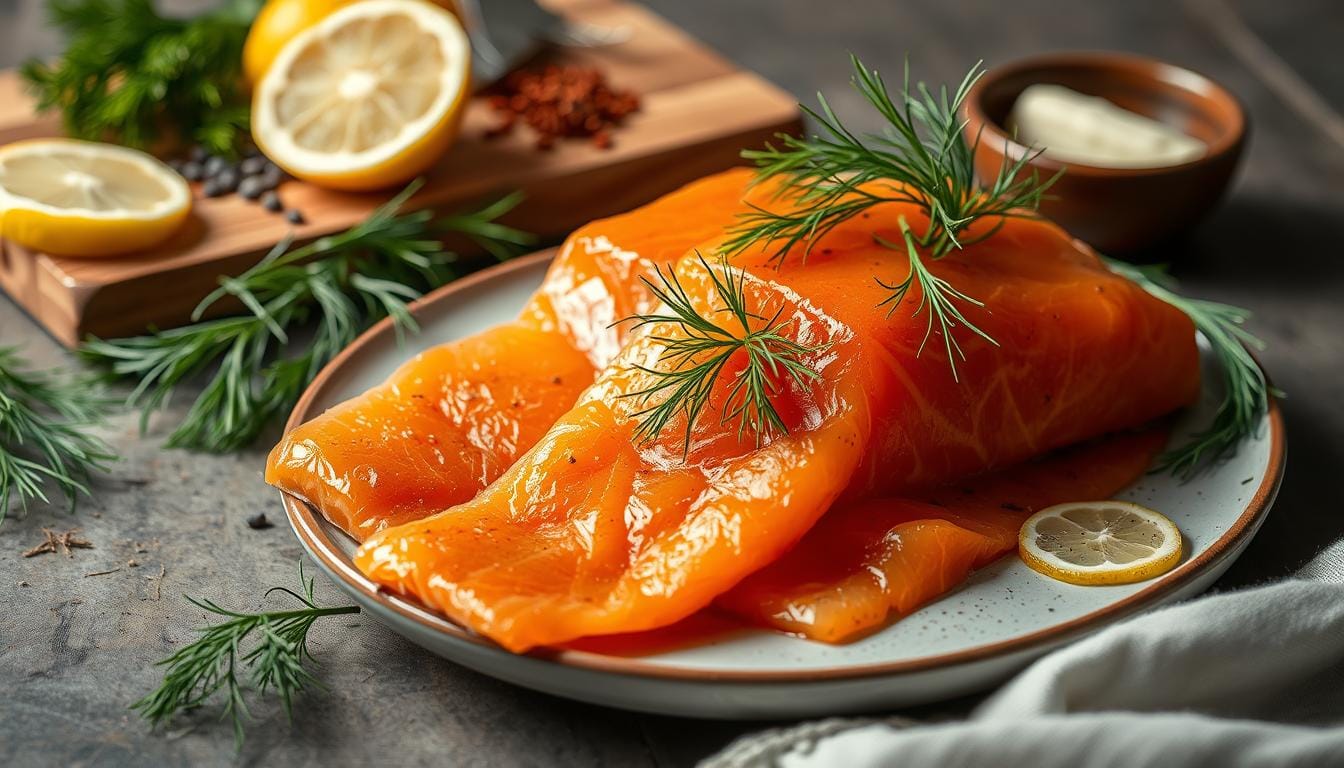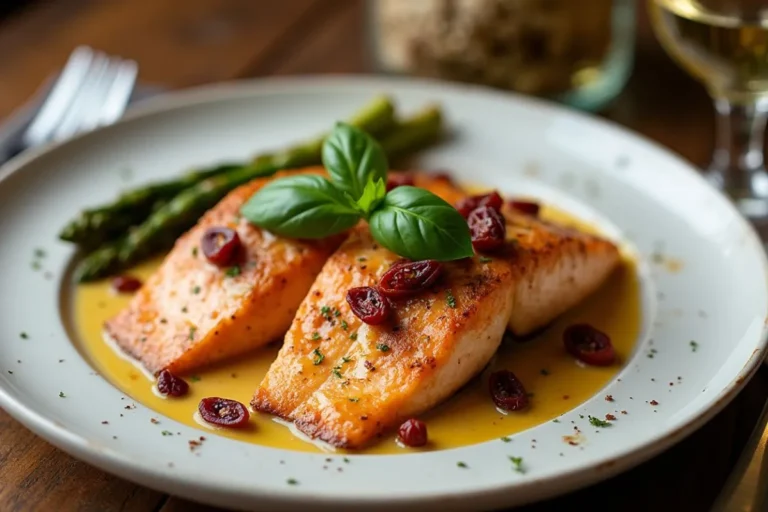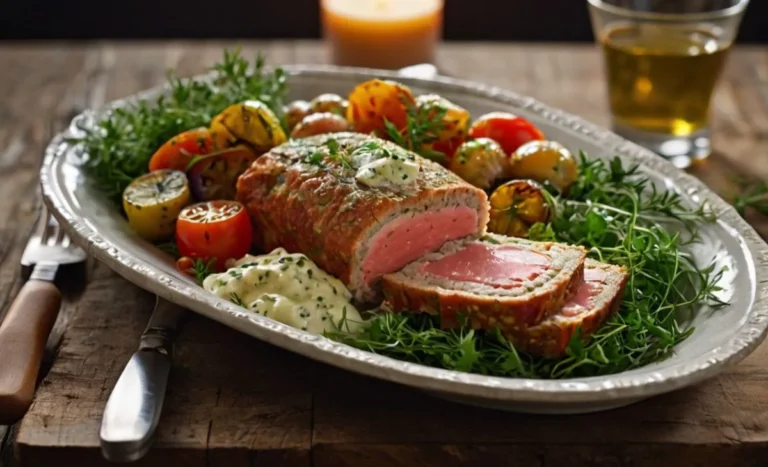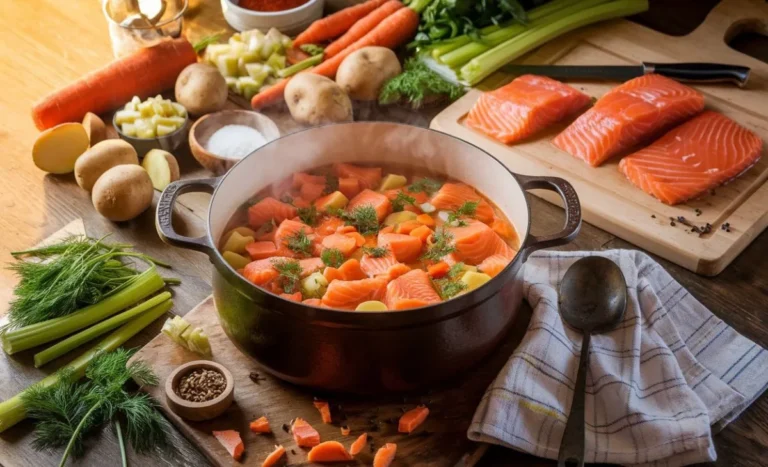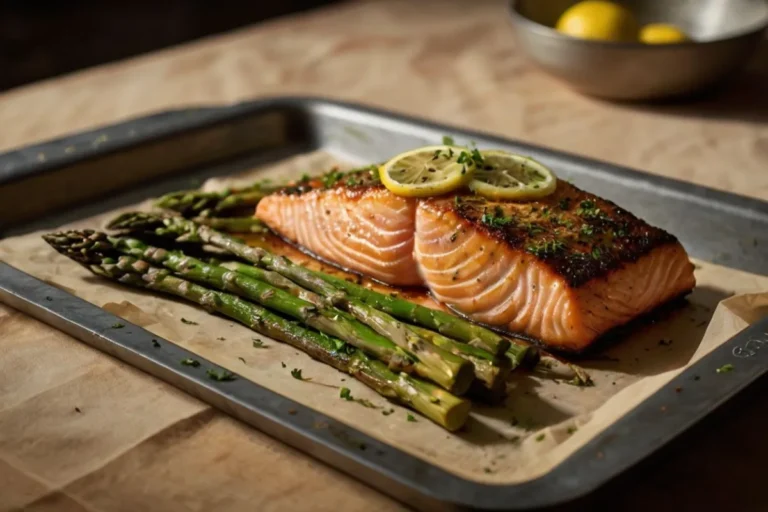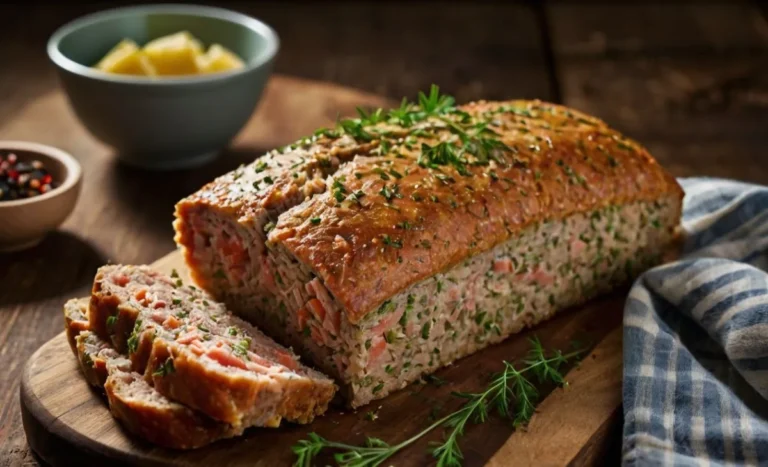How to Smoke Salmon: A Guide to Perfect Results
Smoking salmon is a great way to make the fish taste better and feel softer. Hot-smoked salmon is tender inside and slightly chewy outside. It has a smoky, sweet flavor. You can eat it alone, mix it into dishes, or use it instead of store-bought smoked salmon.
Smoking salmon at home is easy and cheaper than buying it. It’s a fun and rewarding process.
Key Takeaways
- Smoking salmon at home is a cost-effective way to enjoy flavorful, high-quality smoked salmon.
- Hot smoking and cold smoking techniques produce different textures and flavors in the final product.
- Proper brining, pellicle formation, and wood selection are crucial for achieving the perfect smoked salmon.
- Monitoring the internal temperature and cooking time is essential to prevent dry or overcooked salmon.
- Smoked salmon can be stored and enjoyed for extended periods with proper handling and storage methods.
Understanding Smoked Salmon: Hot vs. Cold Smoking
Smoked salmon comes in two main types: hot and cold smoking. Each method gives a unique taste and texture. Knowing the difference is key to making the best smoked salmon.
Hot Smoking Basics
Hot smoking cooks the salmon at 225°F for about an hour. This makes it flaky and fully cooked, with a strong smoky taste. It’s a favorite on the West Coast, especially among Pacific Northwest indigenous cultures.
Cold Smoking Overview
Cold smoking cures the salmon for a day before smoking it at 90°F for 12 hours or more. It results in a moist, silky texture and a saltier flavor. This type is loved on the East Coast, in Europe, and in Jewish delis.
Temperature and Time Differences
The main difference is in temperature and time. Hot smoking cooks at a higher temperature for less time. Cold smoking cures and smokes at a lower temperature for longer. This creates different flavors and textures, perfect for various dishes.
“Cold-smoked salmon is a delicate, silky treat, while hot-smoked salmon offers a more robust, flaky texture and pronounced smoky flavor.”
Selecting the Best Salmon for Smoking
Choosing the right salmon for smoking is key to a great dish. Look for fish with high fat content. This helps the salmon stay moist and enhances the smoky flavor. Atlantic salmon (farm-raised) and King salmon (wild-caught) are top choices.
Choose salmon fillets or steaks that look firm and shiny. Stay away from fish with fingerprints or tears. Also, avoid salmon with a strong fish smell. If using frozen salmon, thaw it well before smoking for the best taste and texture.
| Salmon Variety | Fat Content | Texture | Recommended for Smoking |
|---|---|---|---|
| Atlantic Salmon | High | Meaty | Yes |
| King Salmon | High | Firm | Yes |
| Coho Salmon | Medium | Delicate | No |
| Sockeye Salmon | Low | Firm | No |
By picking the best salmon for smoking, you’re on your way to a tasty dish. Your friends and family will love it.
Essential Equipment and Tools for Smoking Salmon
Making perfect smoked salmon needs the right tools. You’ll need a smoker, temperature control devices, and more. The right gear ensures a smoky flavor and tender texture.
Smoker Types and Setup
The smoker is key for smoked salmon. Choose from charcoal, gas, or electric smokers. Each has its own benefits. Charcoal smokers give a wood-fired taste, while gas and electric offer better temperature control.
Make sure your smoker is ready and set up right. This is important for the smoking process.
Temperature Control Tools
Keeping the temperature right is vital. Get a digital meat thermometer with two probes. It lets you check the salmon’s internal temperature and the smoker’s temperature.
This helps you cook the salmon perfectly. It prevents it from getting too dry.
Additional Equipment Needed
- Wire racks or grates to hold the salmon pieces
- A sheet pan or broiler pan to catch any drippings
- Wood chips or pellets for generating the signature smoke flavor
- Kitchen shears and tweezers for trimming and removing pin bones
- Aluminum foil for lining the smoker tray and maintaining moisture
With the right salmon smoking equipment and a well-equipped kitchen, you’re ready. You’ll make delicious, smoked salmon at home.
How to Smoke Salmon: Step-by-Step Process
Smoking salmon at home is rewarding and flavorful. To get perfect smoked salmon, just follow this guide:
- Prepare the Salmon: Start by trimming the salmon fillets, removing any pin bones. This makes sure the salmon looks clean and even.
- Brine the Salmon: Put the salmon in a brine solution or rub it with dry brine. This step seasons the fish and keeps it moist.
- Develop the Pellicle: After brining, let the salmon air-dry in the fridge for hours. This creates a tacky surface, or pellicle, for better smoke adhesion.
- Season the Salmon: Rub the salmon with your favorite spices, herbs, or rubs. This is your chance to add extra flavor.
- Smoke the Salmon: Put the salmon in your smoker, keeping the temperature between 180-200°F. Smoke it until it hits 145°F internally, which takes about 2-3 hours for a 3-4 pound side.
By following these steps, you’ll make delicious how to smoke salmon and smoked salmon recipe. It will impress your family and friends.
“Smoking salmon is an art form that requires patience and attention to detail, but the end result is worth the effort.” – Chef Julia Smith
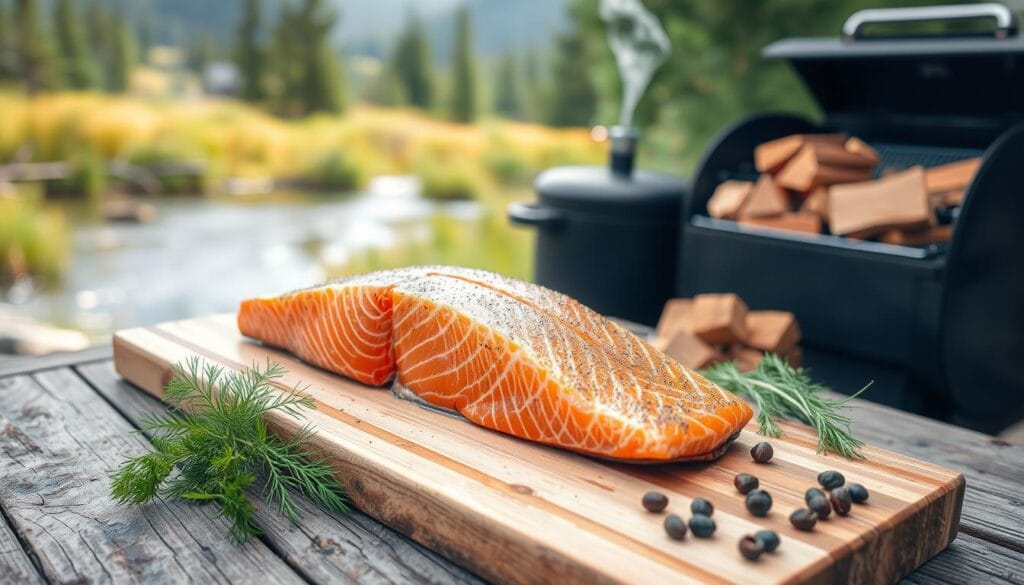
| Salmon Variety | Recommended for Smoking |
|---|---|
| Coho Salmon | Yes |
| Sockeye Salmon | Yes |
| King (Chinook) Salmon | Yes |
| Atlantic Salmon | No |
The secret to great how to smoke salmon and smoked salmon recipe is keeping the right temperature and cooking time. With practice and attention, you’ll soon be serving delicious smoked salmon.
Brining Methods and Techniques
Brining is key in smoking salmon. It seasons the fish deeply and makes it tender. You can choose between dry brining and wet brining. Dry brining is simpler and often preferred.
Dry Brining vs. Wet Brining
Dry brining uses salt and sugar on the salmon’s surface. It pulls out moisture and focuses flavors. Wet brining soaks the salmon in saltwater, letting it soak up the brine.
Optimal Brining Times
Brining time varies based on the salmon’s thickness. Thin fillets need 4-8 hours, while thick ones can brine for up to 12 hours. This ensures the salmon is well-seasoned and moist.
| Salmon Thickness | Brining Time |
|---|---|
| Thin Fillets | 4-8 hours |
| Thick Cuts | Up to 12 hours |
Whether you dry or wet brine, enough time is crucial. It lets the salmon soak up flavors and get the right texture. This step is vital for delicious smoked salmon.
“Brining is the secret to succulent, flavorful smoked salmon. It’s a simple step that makes all the difference.”
Creating the Perfect Pellicle
Smoking salmon is all about the pellicle. It’s a tacky, dried layer that forms after brining and air-drying. This layer is key for smoke adhesion and moisture retention.
To get the perfect pellicle, start by rinsing and drying the salmon fillets. Place them on a wire rack or baking sheet in the fridge for up to 24 hours. This drying process creates a sticky, glossy pellicle essential for great-tasting smoked salmon.
The pellicle should feel slightly tacky to the touch when ready. This ensures smoke flavors stick to the salmon and it stays moist. Without it, your smoked salmon might look dull and feel less than perfect.
| Meat Type | Minimum Pellicle Formation Time | Ideal Pellicle Formation Time |
|---|---|---|
| Pancetta/Bacon Pork Belly | 1-4 hours | Overnight |
| Trout/Salmon Fillet | 30-60 minutes | 1-4 hours |
| Chicken/Turkey Breast | 2-4 hours | 3-6 hours |
| Seafood (General) | 30-60 minutes | 2-4 hours |
| Seafood (Mussels/Scallops) | 30-60 minutes | 1-3 hours |
| Whole Fish (under 6lb/3kg) | 2-4 hours | Overnight |
Creating the perfect salmon pellicle requires patience and detail. By drying and airing the salmon properly, you’ll get a beautiful, glossy surface. This will make your smoking salmon techniques stand out.
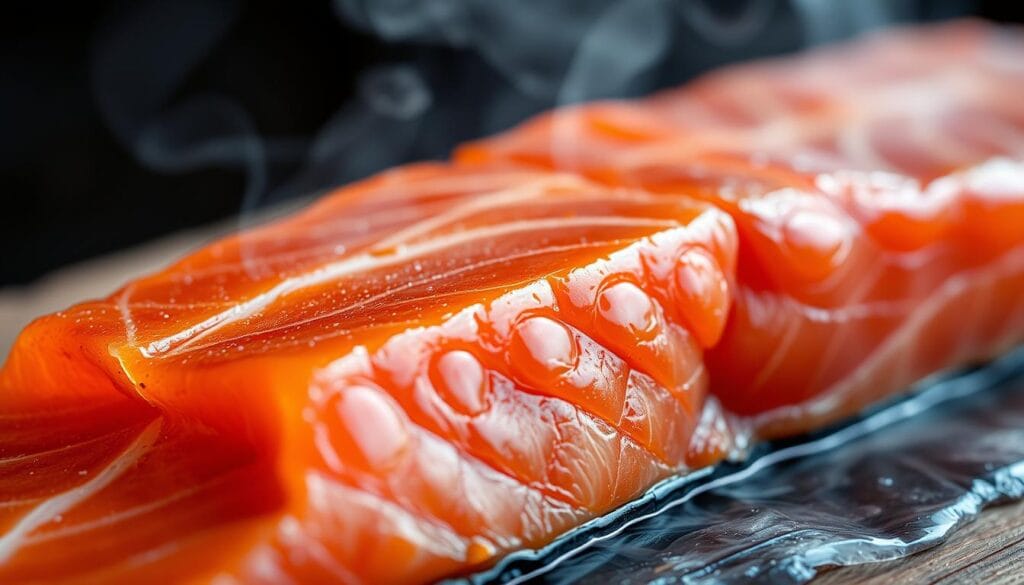
“The formation of the perfect pellicle is the secret to unlocking the full potential of your smoked salmon. It’s a step that shouldn’t be overlooked.”
Wood Selection and Smoking Temperature
Choosing the right wood for smoking salmon is key. Smoked salmon wood chips add unique flavors that enhance the fish’s taste. They make a big difference in how your smoked salmon tastes.
Best Wood Types for Salmon
Here are some top picks for best wood for smoked salmon:
- Cherry wood – It gives a mild, sweet smoke that goes well with salmon.
- Alder wood – A classic choice in the Pacific Northwest, it offers a light, delicate flavor.
- Apple wood – It adds a subtle sweet and fruity taste to the salmon.
- Maple wood – It produces a mild, slightly sweet smoke that boosts the salmon’s natural taste.
- Hickory wood – If you like a stronger, more robust smoke flavor, hickory is for you.
Remember to soak the wood chips for at least an hour before smoking. This helps them burn evenly and consistently.
Temperature Control Guidelines
Keeping the smoking temperature right is essential for great-tasting smoked salmon. Aim for a temperature between 180-200°F. Using a two-probe digital thermometer is a good idea. It lets you track the smoker and salmon’s internal temperature accurately.
“Smoking salmon at the right temperature is the key to unlocking its full flavor potential.”
Monitoring Doneness and Internal Temperature
When smoking salmon, the internal temperature is key. It helps you know when it’s done and gets the right texture. For moist, tender smoked salmon, aim for an internal temperature between 130-135°F. Salmon is fully cooked at 145°F, but this higher temperature can make it drier.
To check the salmon’s progress, use a digital meat thermometer. Put the probe into the thickest part of the fillet, avoiding bones. Remember, the temperature will go up a bit after you take the salmon out of the smoker.
- Ideal internal temperature range for moist, tender smoked salmon: 130-135°F
- Fully cooked salmon temperature: 145°F
- Use a digital meat thermometer to monitor smoked salmon temperature and how to tell when salmon is done smoking
- Account for carryover cooking, as the temperature will continue to rise after removing the salmon from the smoker
By watching the internal temperature closely, you can get smoked salmon just right. It will have a moist and tender center that everyone will love. Keeping the right smoked salmon temperature is crucial for how to tell when salmon is done smoking.
Tips for Preventing Dry Salmon
Keeping smoked salmon moist and flavorful is crucial. Choosing the right salmon and mastering the smoking process are key. Here are some tips to help you achieve perfect results.
Moisture Control Methods
One major reason for dry smoked salmon is poor moisture control. Here are some strategies to help:
- Opt for fatty salmon like Sockeye or Coho. They have more oil, which helps keep moisture in.
- Brine the salmon well. Use a salt-sugar mix or saltwater solution. This helps it hold onto moisture.
- Make a good pellicle. This sticky layer protects the salmon from drying out.
- Keep the smoker at 180-200°F. Higher temperatures can dry out the salmon quickly.
- Remove the salmon when it hits 130-135°F. Cooking it too long makes it dry and tough.
Common Smoking Mistakes
Avoid these common mistakes to prevent dry smoked salmon:
- Don’t use lean salmon. It has less fat and moisture.
- Always brine the salmon. It’s vital for keeping it moist.
- Smoking at over 200°F causes fast moisture loss.
- Don’t overcook the salmon. It should stay juicy and tender.
By avoiding these mistakes and following these tips, your smoked salmon will be moist, tender, and full of flavor.
Storage and Serving Suggestions
Properly smoked salmon is a real treat. Knowing how to store and serve it keeps its flavor and texture great. You can enjoy it for up to a week in the fridge or months in the freezer.
For storage, keep it in the fridge. Smoked salmon lasts two to three weeks or one week after opening. You can also freeze it for up to three months without losing quality.
Smoked salmon is versatile. It’s best to serve 1 ounce per slice, with 3-4 ounces per person. For a party of 4-5, use about 1lb of salmon.
It’s great as a main dish with sides like gazpacho or panzanella salad. It’s also good in sandwiches, on charcuterie boards, or in dips. Serve it with olive tapenade, herb butter, or lemon wedges for extra flavor.
Smoked salmon is perfect hot or cold. It can make many dishes better. With good storage and creative serving, you’ll enjoy your kitchen work.
| Storage Method | Shelf Life |
|---|---|
| Refrigerator | 2-3 weeks, or 1 week after opening |
| Freezer | Up to 3 months |
Pair your smoked salmon with these delightful wine options for an even more enjoyable experience:
- Gewürztraminer
- Riesling
- Chenin Blanc
- White Zinfandel
- Sancerre
- Moscato D’Asti
Remember to serve these wines chilled or very cold for the best pairing with your homemade smoked salmon.
Conclusion
Smoking homemade smoked salmon at home has many perks. It’s cheaper, you can customize flavors, and you get to make a gourmet dish. With the right steps, anyone can make smoked salmon that rivals restaurants.
Choose high-quality salmon and brine it well. Make sure your pellicle is good and keep an eye on the temperature. This guide will help you make salmon that’s both tasty and moist. It will impress everyone you share it with.
Whether you’re experienced in cooking or new to smoking, making homemade smoked salmon is rewarding. Enjoy the journey, try different woods, and relish the taste of your creation.
FAQ
What is the difference between hot smoking and cold smoking salmon?
Hot smoking cooks the salmon at 225°F for a short time. This makes it flaky and smoky. Cold smoking cures the salmon at 90°F for 12+ hours. It makes the salmon silkier and saltier.
What are the best salmon varieties for smoking?
Atlantic salmon and King salmon are great for smoking. They have a lot of fat and a meaty texture. This helps the smoke flavor stick well and keeps the salmon moist.
What essential equipment is needed for smoking salmon at home?
You’ll need a smoker, a digital thermometer, a wire rack, and a sheet pan. Also, wood chips, kitchen shears, tweezers, and aluminum foil are important.
What is the step-by-step process for smoking salmon?
First, prepare the salmon. Then, brine it. Next, develop a pellicle and season it. Finally, smoke it at 180-200°F until it’s done.
What are the differences between dry brining and wet brining for smoked salmon?
Dry brining uses salt and sugar directly on the fish. Wet brining soaks the salmon in saltwater. Both work, but dry brining is simpler.
Why is developing a pellicle important for smoked salmon?
The pellicle is a tacky layer on the salmon’s surface. It helps the smoke stick and keeps moisture in. This makes the salmon taste better and feel softer.
What are the best wood types for smoking salmon?
Cherry wood is a favorite for its mild, sweet smoke. Alder, apple, or maple give a lighter flavor. Hickory adds a stronger taste.
What internal temperature should smoked salmon reach for optimal moisture and texture?
Aim for an internal temperature of 130-135°F for moist, tender salmon. Cooking it to 145°F can make it dry.
How can you prevent dry smoked salmon?
Use fatty salmon, brine well, and make a good pellicle. Don’t overcook by keeping an eye on the temperature. Pull the salmon off when it’s 130-135°F inside.
How should smoked salmon be stored and served?
Store smoked salmon in the fridge for up to a week or freeze it for months. Serve it as a main dish, in sandwiches, or on a charcuterie board. You can also make dips with it.
Source Links
- Easy Homemade Smoked Salmon – https://www.osharak.com/easy-homemade-smoked-salmon/
- Cold Smoked Salmon – Hey Grill, Hey – https://heygrillhey.com/cold-smoked-salmon/
- How to Smoke Salmon at Home – https://www.seriouseats.com/how-to-smoke-salmon-recipe-8621746
- Hot Smoked vs. Cold Smoked Salmon: What’s the Difference? – https://echofallsseafoods.com/blog/hot-smoked-vs-cold-smoked-salmon-whats-the-difference
- The Yummiest Smoked Salmon Recipe – https://happyhomealaska.com/the-yummiest-smoked-salmon-recipe/
- How to Smoke Fish – https://wildgameandfish.com/how-to-smoke-fish/
- How to Candy and Smoke Salmon – https://thegoodoldway.com/candied-smoked-salmon-recipe-how-to-smoke/
- how to smoke salmon – Step-by-Step Guide – https://thyrecipes.com/how-to-smoke-salmon/
- Smoked Salmon in the Oven – https://www.tasteofhome.com/recipes/easy-smoked-salmon/?srsltid=AfmBOoq3_3ynouvOCcFV3cK0PAy-rCnx_tMM_OnE7SU71HheLSeRR5OH
- Smoked Salmon in the Oven – https://www.tasteofhome.com/recipes/easy-smoked-salmon/?srsltid=AfmBOoqxeRnoFDNIh8kN_1wKWbDAn6kw54NQl-sJWyn2J5La5qg_9Cfp
- Smoked Salmon – https://www.wellplated.com/smoked-salmon/
- How to Smoke Salmon: Smoked Salmon Recipe – Angry BBQ – https://www.angrybbq.com/smoked-salmon-recipe/
- How to Smoke Salmon at Home – https://explore.typhur.com/smoked-salmon
- How to Form a Pellicle on Smoked Meat (Salmon & Bacon) – https://eatcuredmeat.com/cold-smoking/how-to-form-a-pellicle-on-smoked-meat-why-is-it-awesome/
- Smoked and Kippered Salmon – https://mycasualhomestead.com/smoked-and-kippered-salmon/
- How to Smoke Salmon – https://iowagirleats.com/how-to-smoke-salmon/
- How to Smoke Salmon – https://www.theslowroasteditalian.com/how-to-smoke-salmon/
- How to Smoke Salmon – https://mgfalaska.com/how-to-smoke-salmon/
- Smoked Salmon Internal Temp: Perfect Every Time – https://www.meatrecipes.net/smoked-salmon-internal-temp/
- Smoked Salmon Temperature Guide – https://www.wowrecipez.com/smoked-salmon-temperature-2/
- best way to Smoked Salmon Internal Temp – https://www.momentsrecipes.com/smoked-salmon-internal-temp/
- Brine Your Salmon If You’re Tired Of The White Ooze – Chowhound – https://www.chowhound.com/1471877/wet-dry-brine-salmon-prevent-albumin-ooze/
- Cold Smoked Salmon – https://saltpepperskillet.com/cold-smoked-salmon/
- Step-by-Step Recipe: How to Make Delicious Candied Smoked Salmon – https://eddyskitchen.wordpress.com/2024/08/14/smoked-salmon-candy/
- How to Store, Serve and Eat Smoked Salmon – https://www.gourmetfoodstore.com/storingserving-smoked-salmon-15156
- Hot Smoked Salmon (Without Brine) – https://stateofdinner.com/smoked-salmon/
- Incredible Healthy Smoked Salmon – https://mondayismeatloaf.com/incredible-healthy-smoked-salmon/
- How to Smoke Salmon | 3 Easy Steps – https://www.flavorcraftrecipes.com/how-to-smoke-salmon-2025/
- How Long to Smoke Salmon at 225°F: Perfect Smoking Time and Tips – https://www.flavorcraftrecipes.com/how-long-to-smoke-salmon-at-225/

